| Weight | 1 lbs |
|---|---|
| Dimensions | 9 × 5 × 2 in |
| host | mouse |
| isotype | IgG1 |
| clonality | monoclonal |
| concentration | 1 mg/mL |
| applications | ELISA, ICC/IF, WB |
| reactivity | tagged fusion proteins |
| available sizes | 1 mg, 100 µg, 25 µg |
mouse anti-DYDDDDK tag monoclonal antibody (FG4R) 5299
Price range: $100.00 through $2,600.00
Antibody summary
- Mouse monoclonal to DYDDDDK tag
- Suitable for: WB,ICC/IF,ELISA
- Reacts with: tagged fusion proteins
- Isotype: IgG1
- 100 µg, 25 µg, 1 mg
mouse anti-DYDDDDK tag monoclonal antibody (FG4R) 5299
| antibody |
|---|
| Database link: DYDDDDK tag (FLAG tag) |
| Tested applications WB,ICC/IF,ELISA |
| Recommended dilutions WB: 1:1000-3000 ICC/IF: 1:500-2000 For best results with other assays (e.g.: Dot, ELISA, IP, etc), please determine optimal working dilution by titration test. |
| Immunogen DYKDDDDK (FLAG) synthetic peptide conjugated to KLH |
| Size and concentration 25, 100, 1000µg and 1 mg/mL |
| Form liquid |
| Storage Instructions -20°C for 2 years or more. °Centrifuge after first thaw to maximize product recovery. Aliquot to avoid repeated freeze-thaw cycles. Store aliquots at 4°C for several days to weeks. |
| Storage buffer PBS, pH 7.2, 0.05% NaN3 |
| Purity affinity purified |
| Clonality monoclonal |
| Isotype IgG1 |
| Compatible secondaries goat anti-mouse IgG, H&L chain specific, peroxidase conjugated polyclonal antibody 5486 goat anti-mouse IgG, H&L chain specific, biotin conjugated, Conjugate polyclonal antibody 2685 goat anti-mouse IgG, H&L chain specific, FITC conjugated polyclonal antibody 7854 goat anti-mouse IgG, H&L chain specific, peroxidase conjugated polyclonal antibody, crossabsorbed 1706 goat anti-mouse IgG, H&L chain specific, biotin conjugated polyclonal antibody, crossabsorbed 1716 goat anti-mouse IgG, H&L chain specific, FITC conjugated polyclonal antibody, crossabsorbed 1721 |
| Isotype control Mouse monocolonal IgG1 - Isotype Control |
| target relevance |
|---|
| DYDDDDK (Flag) tag is a small protein tag that minimally impacts protein structure. This antibody can be used to confirm expression and quantify DYDDDDK (Flag) tagged recombinant proteins in Western blotting and for their purification/copurification. When imaging in situ, DYDDDDK (Flag) tagged proteins can be identified by this antibody when used in conjunction with a suitable secondary antibody. Click for more on: epitope tags and DYDDDDK (Flag) tag |
| Protein names FLAG tag, DYKDDDDK, DDDDK tag |
| Biotechnology The DYDDDDK tag, also known as the FLAG tag, is a short peptide sequence that has become a popular and powerful tool in recombinant protein expression. When fused to the N- or C-terminus of a target protein, the DYDDDDK tag allows for easy detection, purification, and immunoprecipitation of the expressed protein. Its small size and minimal impact on protein folding and function make it an attractive choice for various research applications. The DYDDDDK tag is recognized by commercially available high-affinity antibodies, facilitating the sensitive and specific detection of the tagged protein using techniques like Western blotting or immunofluorescence. Furthermore, the FLAG tag is amenable to purification via affinity chromatography, where anti-FLAG antibodies are immobilized on a resin, enabling efficient and rapid purification of the tagged protein from complex biological samples. The versatility and efficiency of the DYDDDDK tag have revolutionized the field of molecular biology, aiding researchers in studying protein-protein interactions, subcellular localization, and protein dynamics, ultimately advancing our understanding of cellular processes and driving innovative discoveries in various scientific disciplines. |
Data
 |
| 1:1000 (1µg/mL) Ab dilution probed against HEK293 cells transfected with DYKDDDDK-tagged protein vector; untransfected (1) and transfected (2). |
Publications
| pmid | title | authors | citation |
|---|---|---|---|
| 36765089 | Loss of phosphatase CTDNEP1 potentiates aggressive medulloblastoma by triggering MYC amplification and genomic instability. | Zaili Luo, Dazhuan Xin, Yunfei Liao, Kalen Berry, Sean Ogurek, Feng Zhang, Liguo Zhang, Chuntao Zhao, Rohit Rao, Xinran Dong, Hao Li, Jianzhong Yu, Yifeng Lin, Guoying Huang, Lingli Xu, Mei Xin, Ryuichi Nishinakamura, Jiyang Yu, Marcel Kool, Stefan M Pfister, Martine F Roussel, Wenhao Zhou, William A Weiss, Paul Andreassen, Q Richard Lu | Nat Commun 14:762 |
| 36685538 | Duck TRIM29 negatively regulates type I IFN production by targeting MAVS. | Weiqiang Li, Yating Song, Yuqing Du, Zhanhong Huang, Meng Zhang, Zuxian Chen, Zhuoliang He, Yangbao Ding, Junsheng Zhang, Luxiang Zhao, Hailiang Sun, Peirong Jiao | Front Immunol 13:1016214 |
| 36622167 | Diverse Partners of the Partitioning ParB Protein in Pseudomonas aeruginosa. | Adam Kawalek, Krzysztof Glabski, Aneta Agnieszka Bartosik, Dominika Wozniak, Magdalena Kusiak, Jan Gawor, Karolina Zuchniewicz, Grazyna Jagura-Burdzy | Microbiol Spectr 11:e0428922 |
| 36441793 | GluR2Q and GluR2R AMPA Subunits are not Targets of lypd2 Interaction. | Anna Lauriello, Quinn McVeigh, Rou-Jia Sung | PLoS One 17:e0278278 |
| 35906245 | TRIM28-dependent SUMOylation protects the adult ovary from activation of the testicular pathway. | Moïra Rossitto, Stephanie Déjardin, Chris M Rands, Stephanie Le Gras, Roberta Migale, Mahmoud-Reza Rafiee, Yasmine Neirijnck, Alain Pruvost, Anvi Laetitia Nguyen, Guillaume Bossis, Florence Cammas, Lionel Le Gallic, Dagmar Wilhelm, Robin Lovell-Badge, Brigitte Boizet-Bonhoure, Serge Nef, Francis Poulat | Nat Commun 13:4412 |
Protocols
| relevant to this product |
|---|
| Western blot ICC |
Documents
| # | SDS | Certificate | |
|---|---|---|---|
| Please enter your product and batch number here to retrieve product datasheet, SDS, and QC information. | |||
Only logged in customers who have purchased this product may leave a review.
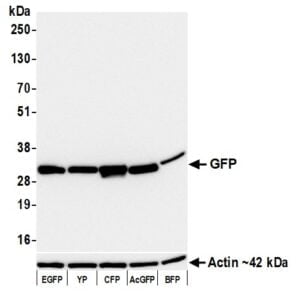
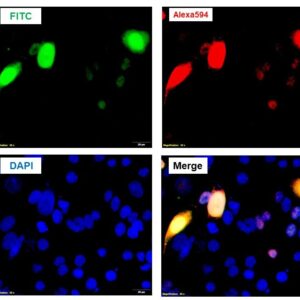
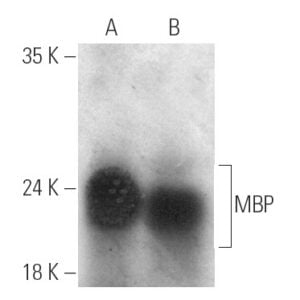
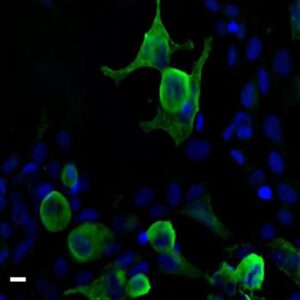
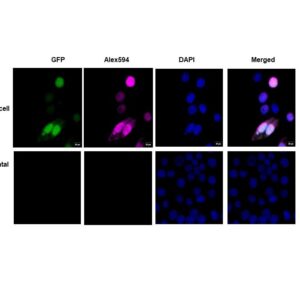
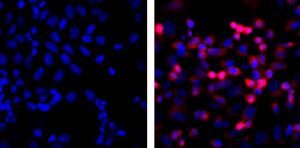
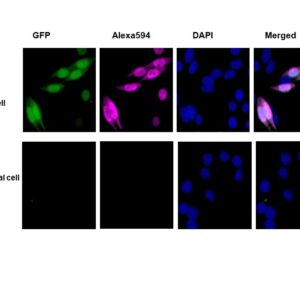
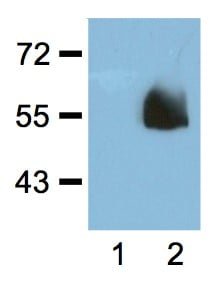
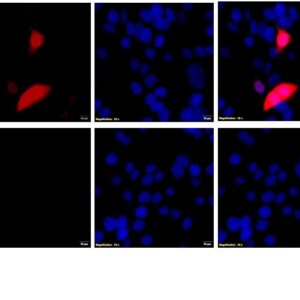
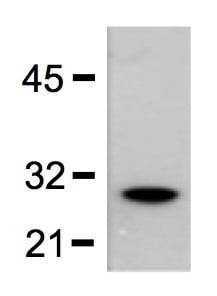
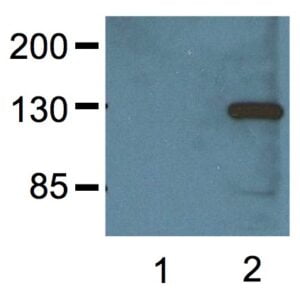


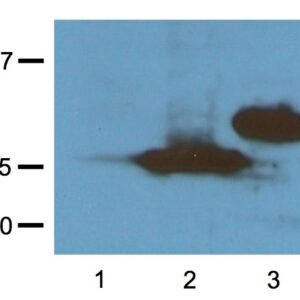
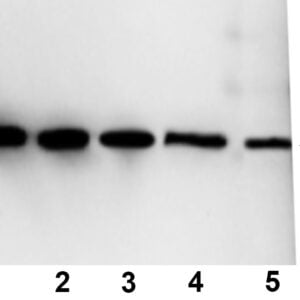
Reviews
There are no reviews yet.